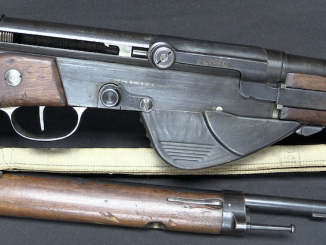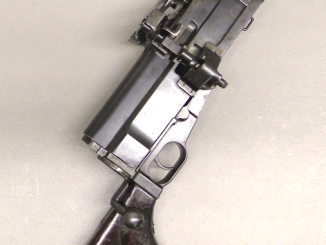Holy cow, a million subscribers! When I started Forgotten Weapons, I never for a moment suspected it would end up this popular. Thank you to everyone who has subscribed! I think this required a celebratory cocktail…specifically, a French 75. So let’s talk about the French 75 the gun – the Canon de 75 modèle 1897 – as well as the cocktail named after it.
In celebration of the milestone, we have a two-day sale on some of the merchandise at the Forgotten Weapons store – which you should check out!
I would also like to mention that you can now find lots of Forgotten Weapons content on Amazon Prime, where videos have been compiled into 1-2 hour themed series.
And last but certainly not least, a huge thanks to everyone who supports Forgotten Weapons on Patreon! Your support is what has made this possible, and what will keep it here for years to come.




Ah, Yvonne . . .
Congratulations, Ian! Quite a milestone. Excellent choice with the Plymouth gin in what appears to be a very tasty cocktail. I may just have to snag one of those French 75 t-shirts…tres sharp. Again, well done, and thanks for all you do.
1 million subscribers seems easy to explain;
(1)Intelligent appraisals
(2)Eloquent explanations
(3)You don’t appear to be a nutcase
Doesn’t APPEAR to be….
There are a lot of nutters with guns on youtube. Mr McCollum doesn’t appear to be like them 😉
Congratulations on the 1 million!Your channel is deserving of success.
Not much of a mixed-drink drinker but that sounds like a tasty tope. I bet you were thrilled to hit 1,000 subscribers. Now I am as anxious for Christmas as I ever was as a child!
[off-topic so ignore if you wish]
REQUESTING ANY DATA regarding machine gun known as PROFENSE PF50, 2 photos and some data are available here: http://alternathistory.com/pulemet-pf-50-ssha/
Data given are as follows:
– it is externally powered machine gun
– cartridge: 12,7×99 NATO
– have muzzle brake
– overall length 1524 mm, overall mass around 34 kg
– Rate-of-Fire: 450…550 rpm
– exists two version: “pintle” and “co-ax”
I found a brochure for it, that’s about it.
oops.
https://i.imgur.com/OpVBnY5.jpg
Thanks, it is described as ELECTRICALLY POWERED CHAIN-DRIVEN MACHINE GUN.
Does this mean it is de facto up-scaled L94A1 tank machine gun?
I see no t&e mechanism.. must be a co-ax set up as a display. Mock-up?
One of the worst nightmares for any infantryman during the Great War: enemy artillery. Basically, if you didn’t take out enemy field guns, they’d get you first. And we’re not even including machine gun positions yet. Let’s don’t even get into the stupid bandits who think that all you need to do to take out cannons is dodge the shells and then head-shoot all the cannoneers (artillerymen DO NOT go for headshots, mind you, so attempting to dodge artillery shells in open field is probably a bad idea). The artilleryman’s response to an ineffective charge is something along the lines of: “Ho, ho, ho, good joke dude, just you try to get in our faces. How about if I stuff YOUR face with a shrapnel sandwich, HUH!?”
Ian Hogg (Master Gunner, Royal Artillery) once said, “In the artillery, we don’t ‘rally ’round the colors’ like the infantry. Our rally point is the nearest gun that will still fire.”
Or in plain English, the “Redlegs” will always be found rallying at the nearest piece of ordnance that they can still kill you with.
cheers
eon
Congratulations!
Congratulation, to Your first million!
Something You might not have stumbled over:
When the new 7.5 cm gun became known to german public, it caused a nation wide panic and even a stock market crisis as everybody believed, the snail eaters were coming to take bloody revenge, for the war of 1870-71 and the german military had no means to stop them.
Oh, I forgot as well as You:
This same gun became the main armament of the M4 Sherman and a bunch of other fighting vehicles, so that the Canon de 75 modèle 1897 became, at least, the honor to smash the boche.
Strictly speaking M3 gun as found in M4 Sherman evolved from, but is not same as 1897, though these two share same cartridge.
https://en.wikipedia.org/wiki/75_mm_Gun_M2/M3/M6
it later itself evolved into M6, which become main armament of M24 Light Tank, which become widespread internationally after end of WWII.
Anyway according to https://www.retromobile.com/Visitors/Exhibitions-and-events/Events-2017/The-last-two-specimens-of-the-first-french-tanks-introduced-at-Retromobile-by-the-Saumur-tank-museum yet back in August 1914 General Jean Baptiste Eugène Estienne declared Gentlemen, the victory in this war will belong to whichever of the two belligerents is the first to succeed in placing a 75-mm gun on a vehicle able to be driven on all-terrain. Thus early French tanks were armed with 75 mm guns, though only SAINT-CHAMOND was carrying 1897.
Hours and Hours of Ian and Forgotten Weapons on video at Amazon Prime! Curated to specific topic, no less! Now THAT is a Christmas gift!
Ian, I really enjoyed downloading some of the compilations off amazon prime video. I recently took Amtrak from Trinidad Colorado to Cleveland Ohio and the rifles of North Korea was particulary enjoyed.
Congratulations on hitting one million Ian, and a merry G11mas for us all.
The Museum of the American GI in college station Texas has one of these that fires blanks at events…quite cool with a Nash Quad to haul the cassion and gun. They also have a fabulously restored French FT tank (not a US copy M1917) with working 37MM gun. Soo…I need to get a T-shirt to go with my Puckle Gun shirt.
Congratulations Ian, this is wonderful news! As a daily watcher and Patreonist (yet not Youtube-account holder), I say you deserve all recognition and appraisal for your efforts. Keep up the good work & have a great holiday season.
Best,
Jan van Egmond
The Netherlands
Congratulations! It’s a well deserved milestone, and it’s refreshing to see someone have so much success in something they’re so passionate about. I watch one your videos every day on my lunch break and it’s just a wealth of knowledge about history, engineering, as well as firearms. Best of luck and here’s to another million!
Sure hope that was super-cheap bubbly. A man should never poison good champagne with
with
GIN!
Congratulations, Ian. Well-earned and much-deserved.
cheers
eon
As a man who enjoys fine Scotch, I appreciate a gentleman with refined taste in his beverages. Here’s a toast to continued success in all your endeavors: Y*Y
I opened at least five Nevada Day Parades by firing the Nevada Army National Guard’s French 75 (blanks only, of course). Had to haul it around, service the beast, do the paperwork. When I retired from the Guard in 2010 I got to run the new guy through care and feeding of the French 75 for the 2010 parade.
Other famous 75mm guns abound in museums and even Disneyland has a pair of Hotchkiss guns:
http://duchessofdisneyland.com/disneyland/town-square-cannons/
http://www.spanamwar.com/hotchkis.htm
Speaking of the popular 3-inch bore rifled artillery piece, most people know that Custer left behind his Gatling guns when he had his final battle at the Little Big Horn–but most don’t know that the rest of Custer’s artillery park consisted of three-inch bore rifled cannon. I’m no Custer fan, but the Gatling gun of the period was an artillery piece in practice and Custer, no newly-minted second lieutenant fresh from West Point, had considerable battle experience in both “conventional” and guerrilla war. Artillery just impeded mobility in guerrilla warfare and this has application to the French 75mm quick-fire artillery.
As I said, I’ve handled the French 75 as a salute gun–and often I was the only gun crew. I’d enlist bystanders to help put the beast in position and then park my deuce and a half nearby so that I could hook up and depart–getting out of the way of the parade was the next step after firing the blank cartridge. I’d take it to the state headquarters and service the piece, get it ready to return to the Nevada National Guard academy near the Stead airport (site of the Reno Air Races)…
A gun crew of two might manage the piece, but the full crew when emplaced was six. Shrapnel fuses required setting. Artillery often wasn’t firing at point targets–massed infantry and cavalry were the intended targets. As initially deployed, the French 75 was in range of rifle fire. Later, it was used for indirect fire (requires a fire direction center and forward observers and communications) but this was initially designed for rapid deployment to deal with enemy troops in the open. Each regiment had a battery of four (I think it was four–could have been two in some armies) and when compared to the Maxim Gun on the standard “infantry target” (a large cheesecloth or linen sheet 100 feet long and six feet tall) a battery of 75’s firing shrapnel (long range) or canister (up to perhaps 350 meters) would put more holes in the target than a battery of Maxim guns in one minute. The French 75 had a “common shell” (high explosive) and significantly more range than a Maxim gun–and when the Maxim Gun was mounted on an artillery carriage, there wasn’t a lot of mobility difference–or much difference in the time required for deployment and emplacement.
Good video and congratulations!
One million subscribers, that should bring some money home!
My bet is that there is at least 20x as many who are not (including myself). But I am still a fan and pitched in the past couple of times.
Oh, when comes to gin it has to be Beefeater, no way without it http://www.lcbo.com/lcbo/product/beefeater-london-dry-gin/570#.XA2Ux-SWxjo
For hose who do not know, in Canada alcoholic beverage are retailed thru government run stores.
Prosit!
The optimistic view of mobile warfare before WWI was not just in French domain. Germans had similar, but lighter gun and with shorter range.
https://en.wikipedia.org/wiki/7.7_cm_FK_96_n.A.
Its barrel was also equipped with recoiling mechanism (sprig/ oil); breech opened to side.
As the war was grinding on they recognised the error and brought in larger caliber howitzers. At the end it was almost exclusively howitzers which decided flow of the battle. Those who survived often yelled at night, drenched in sweat: howitzers. howitzers!
Sounds shit.
Shitter still, for the losers.
I received this video by mail
https://www.youtube.com/watch?v=V9fkiBrhaUA
… very descriptive. Lots of authentic footage.
Anyway, Germans would not have lost, not a chance. The cause was in politicians background manipulation; colonel House and Balfour. Once U.S. were in it was decided. Sure, naval blockade did its own too.
Cheers, for video looks great if somewhat depressing. And the history… Which is interesting, thank you.
I knew something about the naval blockade prior, in that we wouldn’t quit it when they signed that deal in the railway car Adolf was all annoyed about later; it was on tv recently for the armistice commemorations.
Starved, sour Krauts.
https://youtu.be/FagjnIgUk6Q
My sister recorded it originally off top of the pops “shes older than me” it was partially taped over by my Dogtanian cartoons via my parents; 1983, always rembered it he he.
Long time ago, really.
Merit of he video I passed on is in very well preserved and restored documentaries of the times during and after WWI. It is good for “war lovers” to watch how weapons and tactics are implemented. That is most of volks frequenting this web, as I believe.
However, it does not address root causes of war, just merely says: this and that happened. From the second category is this – first part series. It goes head on with the task.
https://www.youtube.com/watch?v=tclAbWvBt70
“root causes of war,”
This was area of many researches, according to
http://csweb.brookings.edu/content/research/essays/2013/rhyme-of-history.html
Scholars have combed through archives from Belgrade to Berlin looking for the causes. An estimated 32,000 articles, treatises, and books on World War I have been published in English alone.
But I must WARN you that above links is center about some similarities between 1914 and dawn of 21th century, not solely detecting reasons of actions undertaken in 1914.
“Sounds shit.”
WAR DECLARED BY ALL
AUSTRIA DECLARES WAR ON SERBIA DECLARES WAR ON GERMANY DECLARES WAR ON FRANCE DECLARE WAR ON TURKEY DECLARES WAR ON TURKEY DECLARES WAR ON RUSSIA DECLARES WAR ON BULGARIA DECLARES WAR ON BRITAIN
OTTOMAN EMPIRE ALMOST DECLARES WAR ON ITSELF
NATIONS STRUGGLE TO REMEMBER ALLIES
Although intended to be joke, this: https://www.theonion.com/august-5-1914-1819588242
gives good feel of complicated relations between European powers in 1914.
” Germans had similar, but lighter gun and with shorter range.”
German 7.7cm Feldkanone 96 n.A. http://www.landships.info/landships/artillery_articles/Feldkanone_C96_nA_1.html
was direct answer to French 1897, but Germans unlike French, have developed before Great War some high-angle firing artillery pieces like for example 17 cm mittlerer Minenwerfer, while other Central Power – Austria-Hungary have adopted in 1914 (though I do not if it was before or after declaring war) 10 cm Feldhaubitze M.14 (Škoda), while German Empire adopted modern 10,5 cm howitzer yet back in 1909 as 10.5cm leichte Feldhaubitze 98/09 http://www.landships.info/landships/artillery_articles/lFH_98_09.html
Mistake made by France was not introduction of 75 mm field cannon, but resignation from heavier guns for field usage.
Though to be honest France have lightweight 155mm
http://www.landships.info/landships/artillery_articles/Canon_155_M1904_Rimailho.html
(looking at M777 howitzer I might add before it was cool)
although light for its caliber, it was still noticeably heavier than other nations ~100 mm howitzers
…good set of pictures!
Please note how thick were barrels of “light” field artillery pieces at the time. They were supposedly forged out of ingot, NOT cast like ages before. Also, they had 2-3 liners with application of auto-frettage (shrink fits). It kind of mesmerises me especially considering their humble muzzle velocities and ranges.
Of course, you can tell me that order was made to customer’s expectation and since military brass was used to thick barrels, they did not trust anything else. Let troops handle it – they have 7-9 members in team not to be idle. This tradition was carried on with German guns in particular; during WWII they were all heavier than Russian counterparts. No wonder Germans were keenly adopting 76mm Soviet divisionnaya pushka in huge numbers.
“It kind of mesmerises me especially considering their humble muzzle velocities and ranges.”
Keep in mind that in that time there was trend for high Rate-of-Fire in such weapons, which means barrel should be heavy enough to serve as heat sink.
Supposed secret of the 75’s rapid rate of fire was the recoil mechanism. When the Americans got their first ones, they tore one apart. The French were very upset as the german silver seal rings were considered most secret by them.
Here I want to note 1897 wasn’t first gun with recoiling mechanism, see photos:
https://ru.wikipedia.org/wiki/%D0%A1%D0%BA%D0%BE%D1%80%D0%BE%D1%81%D1%82%D1%80%D0%B5%D0%BB%D1%8C%D0%BD%D0%B0%D1%8F_%D0%BF%D1%83%D1%88%D0%BA%D0%B0_%D0%91%D0%B0%D1%80%D0%B0%D0%BD%D0%BE%D0%B2%D1%81%D0%BA%D0%BE%D0%B3%D0%BE
Congrats, Ian… and CHEERS!
You seem to have added another facet to your expertise… MIXOLOGIST! 🙂
Congrats!!! Now you could hire an assistant and have him or her demonstrate the delicate procedure of firing the little British P.IA.T. Or not. Keep up the great work
My wifes grandfather was a lieutenant marechal de logis in the fifty eigthth of artillery third battery Although he was later gassed his first wound was inflicted by one of the batteries horses that kicked him in the head as he waited to take supplies back to his position
For canadians in Harriston Ontario Canada there is a french seventy five at the cenetaph It even has shrapenel damage
Congrats on hitting your first million Ian, You are the best online source of info on obscure weapons bar none.
P.S. When you say “Hi, I’m Ian” my family chimes in “Hello Ian!” 🙂
Maybe somewhat late, but surely fits our topic:
https://epitoma-rei-militaris.tumblr.com/post/180497240798/the-taste-of-paradise-featuring-the-mle-1897-75mm
Yes, extremely well done, Ian. Congratulations!
(Fully 20% of my time on the internet is spent watching your videos and mulling over the comments section.)
You simply bring the most concise, practical, and logical firearms discussion to the web, period. That alone is what sets your work apart. The absence of politics, and the inclusion of historical analysis, and the breakdown of design concepts are all just gravy on top.
In other words, you set the standard for what the InterWebs can be at its best. So many others could learn from your example. And the fact that your whole overriding intention is to archive mechanical history for the sake of posterity is most admirable, IMHO.
Thank you for your efforts. Please continue to inspire more of us with your work, for many years to come.
_______
sat celeriter fieri quidquid fiat satis bene
“That which has been done well has been done quickly enough”